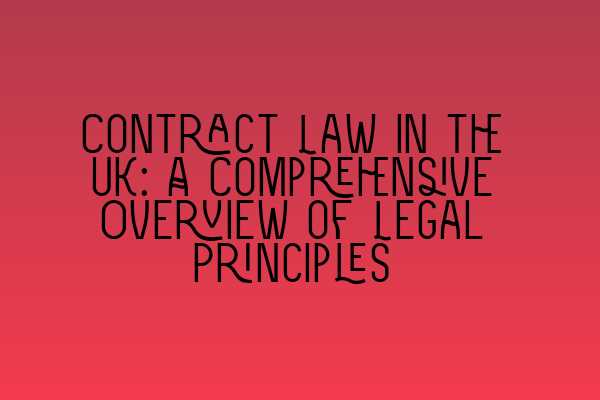Contract Law in the UK: A Comprehensive Overview of Legal Principles
Contracts are the backbone of business transactions and personal agreements. They provide a framework for parties to establish rights and obligations, ensuring that all parties are protected and their interests are upheld. In the United Kingdom, contract law is a fundamental area of legal practice that governs the formation, interpretation, and enforcement of contracts.
Whether you are a business owner, an aspiring solicitor, or simply interested in understanding the legal principles that underpin contractual agreements, this comprehensive overview of contract law in the UK will provide you with a solid foundation.
The Basics of Contract Law
In order for a contract to be legally binding, certain elements must be present. These include:
- Offer and Acceptance: An offer is made by one party, and the other party accepts the offer.
- Consideration: There must be something of value exchanged between the parties, such as money or goods.
- Intention to Create Legal Relations: The parties must intend for the contract to be legally enforceable.
- Capacity to Contract: The parties involved must have the legal capacity to enter into a contract.
- Consent: The parties must freely and voluntarily agree to the terms of the contract.
- Legality: The contract must not involve illegal activities or go against public policy.
These elements form the foundation of contract law and are essential for the validity of any contract. It is important for all parties to be aware of these principles when entering into a contractual agreement.
Types of Contracts
Contracts come in various forms, depending on the nature of the agreement. Some common types of contracts include:
- Express Contracts: These are contracts where the terms are explicitly stated, either in writing or orally.
- Implied Contracts: These are contracts where the terms are not explicitly stated but can be inferred from the conduct of the parties.
- Unilateral Contracts: These are contracts where one party makes a promise in exchange for a specific act or performance by the other party.
- Bilateral Contracts: These are contracts where both parties make promises to each other.
- Voidable Contracts: These are contracts that are valid but can be avoided or canceled under certain circumstances.
- Executed Contracts: These are contracts that have been fully performed by both parties.
- Executory Contracts: These are contracts that have yet to be fully performed by one or both parties.
Understanding the different types of contracts can help parties navigate the legal landscape and ensure that their agreements are in line with the appropriate legal principles.
Interpretation of Contracts
Even with clear contractual terms, disagreements can arise regarding the interpretation of these terms. When faced with such disputes, the court’s role is to interpret the contract and give effect to the intentions of the parties.
The court will consider various factors when interpreting a contract, including:
- The plain and ordinary meaning of the words used in the contract
- The context in which the contract was made
- The intentions of the parties at the time of entering into the contract
- The commercial purpose of the contract
- The previous dealings between the parties
Interpretation of contracts requires a careful analysis of the language used and the broader context in which the contract was formed. It is important to seek legal advice if there are any ambiguities or disputes concerning the interpretation of a contract.
Remedies for Breach of Contract
When one party fails to perform their obligations under a contract, it is considered a breach of contract. In such cases, the innocent party may seek legal remedies to be compensated for any losses suffered due to the breach.
The main remedies for breach of contract include:
- Damages: This is the most common form of remedy, where the innocent party is awarded monetary compensation to cover their losses.
- Specific Performance: This remedy involves the court ordering the breaching party to perform their obligations under the contract.
- Rescission: Rescission allows the innocent party to cancel the contract and be restored to the position they were in before the contract was entered into.
- Reformation: In certain cases, the court may reform or modify the terms of the contract to make it more equitable for the parties involved.
The choice of remedy will depend on the circumstances of each case and the specific relief sought by the innocent party.
Seeking Legal Advice
Contract law is a complex and nuanced area of legal practice. It is crucial to seek professional legal advice when entering into contracts to ensure that your rights and interests are protected.
At SQE Contract Law, our team of experienced solicitors specializes in contract law and can provide guidance on all aspects of contractual agreements. Contact us today for a consultation and let us assist you in understanding and navigating the intricacies of contract law in the UK.
Further reading:
- Barrister vs. Solicitor: A Comprehensive Comparison
- Embracing the Rise of Virtual Law Practices
- Unveiling Real-Life Case Studies: Insights into Legal Practice and Decision-Making
- Exploring Solicitor Salaries in the UK: Average Earnings and Factors Affecting Income
- Mastering Client Relationship Management: Skills for Solicitors to Enhance Trust and Loyalty
